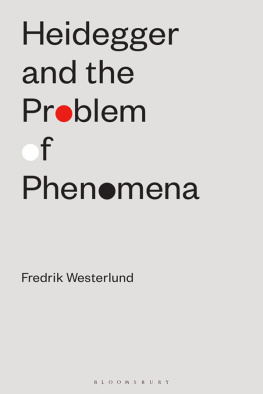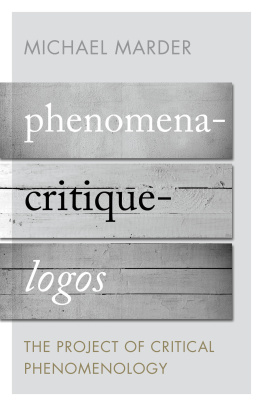
Heidegger and the Problem of Phenomena
Heidegger and the Problem of Phenomena
Fredrik Westerlund

BLOOMSBURY ACADEMIC
Bloomsbury Publishing Plc
50 Bedford Square, London, WC1B 3DP, UK
1385 Broadway, New York, NY 10018, USA
Bloomsbury, Bloomsbury Academic and the Diana logo are trademarks of Bloomsbury Publishing Plc
First published in Great Britain 2020
Copyright Fredrik Westerlund, 2020
Fredrik Westerlund has asserted his right under the Copyright, Designs and Patents Act, 1988, to be identified as Author of this work.
For legal purposes the Acknowledgments on p. viii constitute an extension of this copyright page.
Cover design by Anna Hidvgi
All rights reserved. No part of this publication may be reproduced or transmitted in any form or by any means, electronic or mechanical, including photocopying, recording, or any information storage or retrieval system, without prior permission in writing from the publishers.
Bloomsbury Publishing Plc does not have any control over, or responsibility for, any third-party websites referred to or in this book. All internet addresses given in this book were correct at the time of going to press. The author and publisher regret any inconvenience caused if addresses have changed or sites have ceased to exist, but can accept no responsibility for any such changes.
A catalogue record for this book is available from the British Library.
A catalog record for this book is available from the Library of Congress.
ISBN: HB: 978-1-3500-8647-0
ePDF: 978-1-3500-8648-7
eBook: 978-1-3500-8649-4
Typeset by Newgen KnowledgeWorks Pvt. Ltd., Chennai, India
Printed and bound in Great Britain
To find out more about our authors and books visit www.bloomsbury.com and sign up for our newsletters.
Also Available from Bloomsbury
Heideggers Style: On Philosophical Anthropology and Aesthetics , Markus Weidler
Heideggers Politics of Enframing: Technology and Responsibility , Javier Cardoza-Kon
The Ethical Imagination in Shakespeare and Heidegger , Andy Amato
CONTENTS
The roots of this book stretch back around twenty years, to when, as a philosophy student at the University of Helsinki, I first became captivated by Heideggers thinking in the late 1990s. Later, I wrote my PhD thesis on Heidegger and the problem of phenomenality, completing and defending it in 2014. After that, I have continued my reflections on Heidegger and thoroughly reworked my dissertation into the present book.
This book is the outcome of, and gives expression to, my long critical wrestle with Heideggerand, crucially, with myself. When as a student I started reading Heidegger, I was immediately intrigued. Heideggers radical pursuit of the basic philosophical questions, his insistence on their existential relevance and motives, and his phenomenological hands-on approach opened up a new sense of what concrete philosophical thinking can be. I learned a lot. However, as my own phenomenological thinking developedand as a result of my intensified reflections on the moral psychology and ethical-existential concerns of our interpersonal lifeI started to grow more and more wary both of central parts of Heideggers philosophical vision and of the ethical-existential spirit of his thinking. My doubts and my critical gaze also concerned myself and the motives that had fueled my enthusiasm for Heidegger. I started to sense that many aspects of the emotional atmosphere of Heideggers thinking that I had been drawn toespecially, the grandiosity and superior weight that Heidegger ascribes to the ontological task of philosophy and his supreme contempt for much of contemporary philosophy and lifecould, to a significant degree, be seen as expressions of an attitude characterized, not by unreserved independence and openness, but by ressentiment and by a desperate deferred desire for self-assertion. I also grew more and more suspicious of Heideggers driving philosophical idea about the basic historicity of being and thinking, which, when radically pursued, seems to cover up both the ethical-existential significance of human beings and the possibility of truth.
My hope is that my own dual impulses toward Heidegger and my struggle to come to terms with them have helped to bring to lifeand to claritythe tension and dynamics obtaining between the genuine possibilities and insights of Heideggers thinking and the philosophical and ethical-existential problems that haunt it.
Here, I want to thank all those who have read and commented on the manuscript, or parts of it, along the way, and those with whom I have discussed and debated the central themes of the book: Jussi Backman, Joel Backstrm, Jaakko Belt, Tatjana Brandt, David Cerbone, Steven Crowell, Gnter Figal, Mirja Hartimo, Sara Heinmaa, Hannes Nyknen, Simo Pulkkinen, Hans Ruin, Niklas Toivakainen, Thomas Wallgren, and Bernt sterman. In addition to this, there are numerous other friends and colleagues to whom I am grateful for the philosophical discussions we have had over the years. Finally, I want to thank all the members of the Phenomenology Research Seminar in Helsinki for making possible a vital forum for discussion and debate.
I am very grateful for the funding I have received from the Kone Foundation, the Nylands Nation Student Nation, the Oskar flund Foundation, the Otto A. Malm Foundation, the Academy of Finland, the University of Helsinki, and the research network Subjectivity, Historicity, Communality. Without this financial support, the book would not have been possible.
References to the works of Heidegger are as a rule provided in the text by the volume of the Gesamtausgabe edition (Frankfurt am Main: Vittorio Klostermann, 1975, abbreviated as GA), followed by the German pagination, a slash, and the English pagination of published translations where available. There are two exceptions to this practice. First, in the case of Being and Time , I use the abbreviation SZ and only provide page references to the standard German edition published by Max Niemeyer Verlag. This pagination is contained in the margin both of the Gesamtausgabe edition and of the English translations. Second, since Heideggers late text Czanne is not included in the Gesamtausgabe , I use the abbreviation CZ and provide the page numbers of the German original and the English translation listed below. References to Husserl are to the Husserliana series (The Hague: Martinus Nijhoff, 1950, abbreviated as Hua), with the exception of Experience and Judgement , which is not included in the series and for which I use the abbreviation EU. The German pagination is given first, followed by the pagination of the English translation where available. In the list of abbreviations below, I mention the English translations that the page numbers refer to and which I have consulted. I have frequently altered the translations as I see fit, without comment.
HEIDEGGER
| SZ | Sein und Zeit , 17th edition, Tbingen: Max Niemeyer Verlag, [1927] 1993. English translations: Being and Time , trans. Joan Stambaugh, rev. Dennis Schmidt, Albany: State University of New York Press, 2010; Being and Time , trans. John Macquarrie and Edward Robinson, New York: Harper & Row, 1962. |
| CZ | Czanne, in Heidegger Lesebuch , ed. Gnter Figal, Frankfurt am Main: Vittorio Klostermann, 2007. English translation: Czanne, trans. Jerome Veith, in The Heidegger Reader , ed. Gnter Figal, Bloomington: Indiana University Press, 2009. |
Next page











